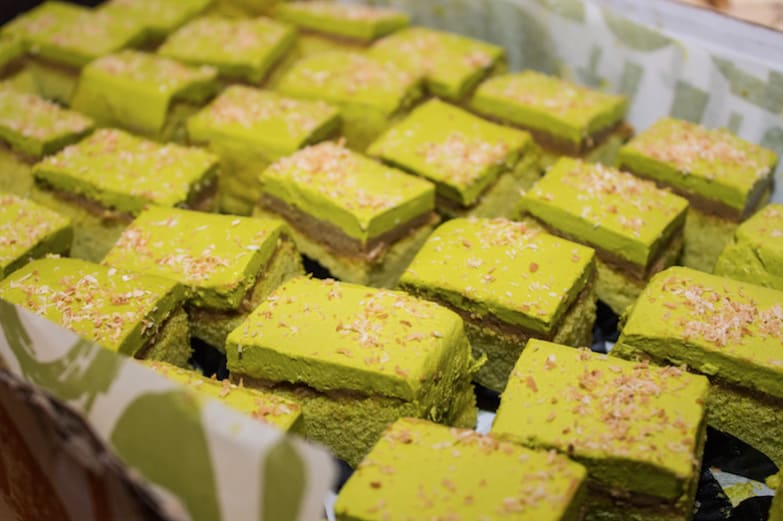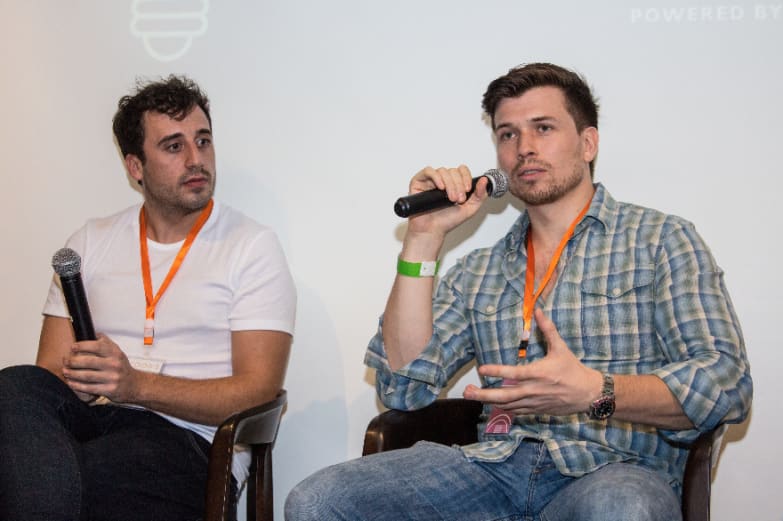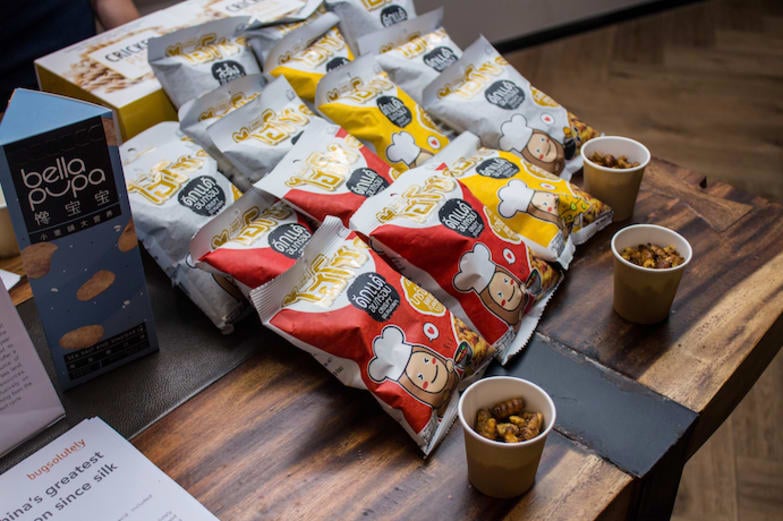We have grown into a world with infinite demands yet we live on a finite planet. By 2050, global populations will have grown by a third. At current food production rates, we may only be able to feed half of that eventual populace. Couple that issue with the environmental and sustainability problems we face and this discussion becomes long overdue.
The dialogue has already begun here in Hong Kong and there are many pioneering efforts to make change within the industry, but so far progress has been slow. Foodie’s Food’s Future Summit was the first large-scale, one-day event designed to bring together change makers, conscious consumers and cutting-edge experts to discover the latest food innovations, upcoming trends and imminent issues in the culinary world and to unite this combined knowledge for a mindful and collective progression toward food’s future.


Foodie started things off right with their low-waste extravaganza at Eaton House where everyone was given a new lunchbox to take home and use during the event, with flasks on hand for anyone who had forgotten their own for use at the water fountain from Urban Spring, coffee and mindful snacks from Cedele, healthful wraps from nood food, conscious canapés from Fete Up and vegan ice cream from Happy Cow. We composted the food waste on site with the help of Oklin’s portable machine and recycled all the Vegware through MANA! – and that was all before we had even got to any of the knowledge sharing that occurred throughout this inspiring day.

Through a series of panels and interactive talks, we explored solutions and debated the challenges facing the food sector with a goal to inspire and initiate change. The Summit began with The Big Picture, where we dove into global trends in food supply and demand and how we can cope and change direction. Richard Brubaker of Shanghai-based China Europe International Business School started things off with his insightful commentary on how China is dealing with the daunting task of feeding the next billion(s). One clear message from his discourse was that we need smarter cultivation to improve production.
We then moved closer to home with Hong Kong’s Invisible Food Crisis where Hong Kong Baptist University’s Dr Daisy Tam took us through the problems with the abundance of issues related to being Asia’s “gourmet city”. She detailed the insecurity of our urban food system and advised on some of the small, everyday decisions diners can choose that will make a difference – something as easy as choosing not to eat at absurdly wasteful buffets. She left us with this wise thought: “The future of food to me should be about the good, not the best.”

The Big Gamble was the next topic of debate with a panel discussion involving Joseph Zhou, an investment partner at China-based Bits x Bites food accelerator and venture capital fund, and David Yeung, the renowned co-founder of Green Monday. Their input included that China is an immense market that isn’t currently generating much food innovation. David shared his investment success in Silicon Valley’s Beyond Meat, the meat-free burger he launched in Hong Kong earlier this year made from a pea protein that remarkably mimics the texture and flavour of beef. He doesn’t believe in just investing but in providing the whole support system to ensure his investments become commercially successful. He also advised on a more flexitarian approach to reducing meat consumption, starting with taking a few days off meat each week to create a huge positive effect on the environment. One of Joseph’s current promising investments is drinkable salad. In Chinese culture, it’s not the norm to eat cold salad, so this provides another avenue for ingesting vegetables as people become more mindful within the nation. They both saw potential for edible insect products such as silkworms. In China, where they have been eaten for thousands of years, insects are generally seen as more appealing than in Western countries.

The Summit segued into the topic of Dining in 2020 and began with two insightful speakers. Nicola Tang of CBRE, a commercial real estate agency, advised on the growing popularity of F&B operators in the city. She noted Hong Kong’s position as a culinary capital that has attracted countless chains looking to expand here, which is likely to continue. She also touched on the more recent co-cooking concepts that are becoming popular in a city with minimal kitchen space and the positive knock-on effects this is having on the choices available on the market. Dr Murray Mackenzie from Hong Kong Polytechnic University then offered his fascinating survey results about Hong Kong’s dining choices. He also spoke on the danger of our city’s ecological footprint, stating that if everyone globally consumed at the same rate as Hong Kongers, it would take 3.9 Earths to currently sustain humanity.

The Dining in 2020 panel comprised an incredibly accomplished group of chef founders to discuss what we can expect and hope to see on our plates in the future. This included Christian G Mongendre, widely recognised as one of the visionaries behind the plant-based movement here in Hong Kong, as well as a zero-waste pioneer with his plant-based restaurants including HOME – Eat to Live; Christopher Mark, Culinary Director of Black Sheep Restaurants, the group behind some of Hong Kong’s hottest eateries like Ho Lee Fook and Maison Libanaise; Andrew Twells, Culinary Director of Compass Group, specialising in providing food services to large businesses like HSBC, with unique insights into the dining habits of the mass market; Joshua Chu, F&B Director and partner at Homegrown Foods, the group behind popular Hong Kong stalwarts Posto Pubblico and Linguini Fini, as well as an advocate of providing clean, premium food grown locally directly to people’s homes, and James Sharman, chef and founder of One Star House Party, a team of homeless chefs who’ve left their grown-up jobs in some of the world’s best restaurants to build 20 restaurants in 20 countries in 20 months, redefining what it means to create a restaurant. This captivating panel debated the growing trends within the industry and complimented each other on their sustainability efforts in each of their respective endeavours. There was a lot of mutual love, and it was inspiring to hear from the passionate industry professionals themselves. Sharman told of his experiences building a pop-up on base camp at Mount Everest, as well as the awe-inspiring simplicity of eating plain rice with Vietnamese fishermen, with the rice doused in different fish sauces made by their wives.

James said, “What I think will remain a constant between now and 2020 is the fact that diners completely influence the industry and, in turn, what the industry outputs. Those diners will remain completely oblivious to this fact, believing that they are at the whim of chefs and restaurateurs. My hope is that those daily decisions of said diners lean steadily towards restaurants with soul, where the person who owns that restaurant lights up at every guest who walks through the door, knowing that the money they spent on fantastic fish that morning won’t go to waste. He/she takes their jackets and leads them to their table whilst psychologically shuffling through the contents of the fridges, pantry and cellar, trying to anticipate the evening. Imagine such a sincere dining experience being commonplace and what could happen to the industry if it were.”
Josh made the poignant point that in the future we need more passionate staff running restaurants. “I would like to see the dining scene with more chef-owned restaurants who are there serving their craft instead of celebrity-chef restaurants. I hope there will be government funding for collection of food waste in restaurants, an improved recycling system and a ban on sharks’ fins.”
![]()
A similar sentiment came from Chris, who said, “In 2020, I hope that more of this interest will have filtered down to the rank-and-file staff and that we will see more home-grown industry leaders.”
Andy remarked, “We will need to continue to be focused on heath and well-being, serving a workforce who will be 95 per cent millennials by 2025, meaning more connected, requiring more information and interest on provenance and the ethical nature of the food that they eat.”


The afternoon session of the Summit began with a food innovation showcase with our friends at Food Savior, on whose platform you can purchase surplus food for a bargain; DNAFit, a personalised nutrition and fitness programme; the advanced technology online wine vendor Loyal Wines; The Mushroom Initiative, which uses recycled materials to produce home-grown mushrooms; Yomee, a unique device for making fresh yoghurt at home; cricket pasta producer Bugsolutely; Livin Farms, makers of edible insect desktop hives; City Hydroponics; Urban Spring; composters Oklin International and GR8choicehk, a distributor for cricket protein bars.

We continued the comprehensive journey with a series of informal round-table discussions to further delve into subjects including Bugs’ Nation, looking at the new world of insect-based consumer goods. We explored the boundaries of eating organic with the Organic 2.0 talk led by Sonalie Figueiras, founder of Green Queen and Ekowarehouse, a global sourcing platform for certified organic products, and China-based farmer Alvin Kwok of Magic Season Organics, who talked about the perception of organic foods versus the reality.
We talked Food Packaging and Sustainable Ocean Health with Doug Woodring, founder of Ocean Recovery Alliance, and Benjamin So of 178 Degrees, a sustainable fish supplier, with the main takeaway that the ocean needs to rest so that it has time to recover. If consumers choose to buy responsibly sourced seafood, which influences the fishermen doing the fishing, it will help the ocean to return to a more balanced state.
The Urban Farming debate was illuminating, with City Hydroponics and Rooftop Republic weighing in on the obstructions with government regulations but also on how growing vegetables in concrete jungles can be a fruitful, enjoyable hobby and a great community unifier.

A round-table discussion with Zero Waste Warriors proved very popular as Fanny Moritz of NO!W No Waste, Cristina McLaughlan of MANA! and Paola Cortese of LoopUnite! divulged their secrets to keep waste to a minimum, with Paola presenting her tiny glass jar with her entire six months’ worth of waste for all to marvel at.
We tucked into Sustainability on the Menu, with the panellists spanning a broad range, beginning with Janice Lao talking sustainability challenges and pursuits within a large luxury-based industry, Caroline Wong of Cedele speaking about the ethos of their particular brand of mid-range cafés and Peggy Chan on her single-enterprise Grassroots Pantry, which is able to ensure that every single element within the restaurant is sustainable and responsibly sourced.
Once the day was done, we were left with much to ponder. The problem-solving, passion-igniting meeting of minds is a process that can inspire the masses to make meaningful change. It doesn’t have to be huge, life-altering commitments; collectively, we have the power to create enormous change through our small daily decisions.
Here are five lessons we learned from the Food’s Future Summit:
It’s impossible to fully discuss food’s future in one day, but this shouldn’t stop us from trying
Once we started planning our Summit agenda, the enormity of the task and the topic became clear. The multiplicity of problems with our current food production and consumption patterns is matched only by the myriad of trends, technologies and techniques being put forth as solutions. While it was heartening to see so many businesses and individuals so passionate about critical causes, it was also a headache when we tried to fit them all into a one-day programme.
In the end, our “cheat sheet” to packing as much into the agenda as possible included: (a) grouping speakers in panels; (b) running simultaneous sessions during the afternoon (sorry – we know many of you wished you could’ve attended all the sessions!) and (c) literally squeezing as many tables and chairs into the event venue as we could. Sadly, it was still impossible to fully discuss the topic or showcase all the companies/individuals with noteworthy enterprises/projects. But it was rewarding to hear many of you tell us that you were inspired by the day’s discussions, made useful connections and gained valuable insights. Lesson learned: the future of food is a tough topic to tackle, but it’s important to keep the conversation going in the right direction.
Well-thy-licious is a thing and it tastes really good
Conferences are inevitably associated with starchy, sugary tea breaks and copious amounts of catered food. Our Foodie cred (if you’ve ever been to our delicious Foodie Club events, you’ll know what we’re talking about!) was on the line, but we were up for it. Many kudos to our sumptuous supporters who offered edible proof that healthy and well-thy food (e.g., unrefined sugar, no artificial flavourings, minimal processing, carefully sourced ingredients) can also taste delicious. We learned that: (a) plates and cutlery are not necessary for the enjoyment of our food – finger food and lunchboxes are great substitutes and ice cream cones trump cups every time and (b) even though we didn’t force any of our attendees to ingest insects, crickets can be yummy when powdered into pasta and protein bars!

A low-waste event is possible — even when it involves 250 people
Given the importance of sustainability in any discussion on food’s future, we were determined to ensure that our Summit also walked the walk. But with so many attendees, reducing our rubbish was always going to be an ambitious endeavour. In fact, we soon realised that we were going to be the first event taking on such a challenge on such a scale, but we’re pleased to report that a low-waste event is perfectly possible – it simply requires some creativity, technology and plain, old-fashioned solutions.
At first, the thought of cutting out all disposable food containers, disposable cutlery and plastic bottled water appeared almost foolish and idealistic. But once we had set our sights on removing as much waste as possible, we realised it wasn’t such an unthinkable task – with a little help from a host of conscious compatriots (e.g., Urban Spring, MANA!, Oklin, Vegware). To ditch printed booklets, we asked everyone to download the programme on their phones and also projected it on a large screen. Thanks to online ticketing, we were able to get in touch with everyone ahead of the Summit to encourage people to bring their own flasks for water and coffee. We also had a food-waste-composting machine on site and coffee cups made from completely compostable eco-materials.
Recycling in HK is complicated
Unfortunately, low waste doesn’t mean no waste – so our next task was to ensure that we recycled everything we could. Recycling bins are a common sight in Hong Kong, so this would be easy, right? Wrong.
Here are a couple of the recycling insights we gained along the way: paper cups can’t be put in paper recycling bins – say what?! Paper cups still have a plastic waterproof lining inside, and very few recycling centres have the technology and ability to recycle such cups (in fact, only 10 per cent of paper mills in Asia can recycle this waterproof lining). Used tissues/kitchen towels/napkins also cannot be recycled. Yes, they’re ”paper“, but they’re often contaminated with food and grease and can actually ruin an entire recycling batch. Products containing plant-based plastic substitutes (i.e., biodegradable polylactic acid (PLA) plastics), although completely compostable, also require special processing and must thus be separated from other recycling. The way we see it, such materials are advances in the right direction, but current recycling technology and infrastructure still need to catch up.
People do care about the impact of their actions
In the run-up to the Summit, we were worried that people might not want to spend their Saturday discussing such serious topics, might not bring their own water bottles or make an effort to separate their rubbish, might find it inconvenient not to have printed programmes – the list goes on. But our fears were unfounded. People came in droves, brought their own flasks and resoundingly applauded the day’s content and low-waste practices. Which brings us to our final and favourite lesson from the Food’s Future Summit – people do care and will make an effort when they are given the right information and tools. #faithinmankindrestored
So, what’s next? Everyone is asking when the next Summit is taking place (no pressure, right?). For now, know that we are working on it. And that the future is happening sooner than we think.

